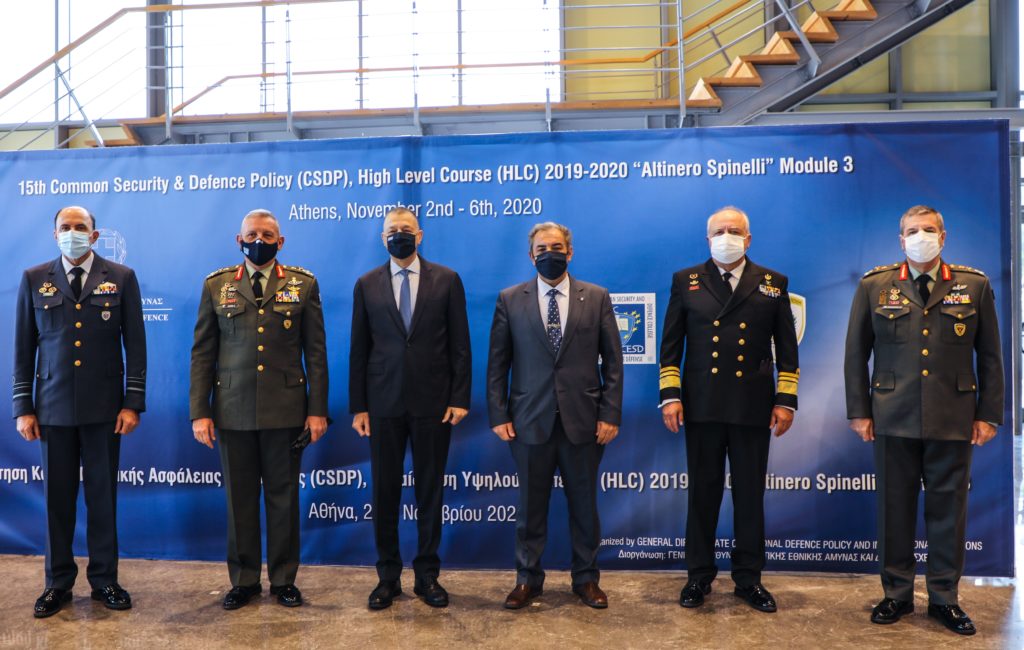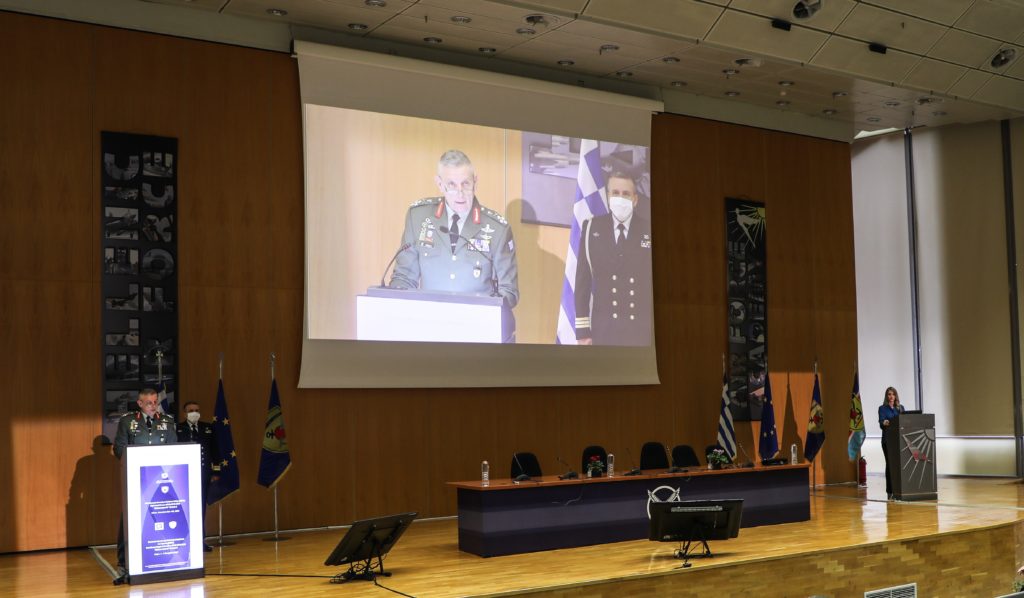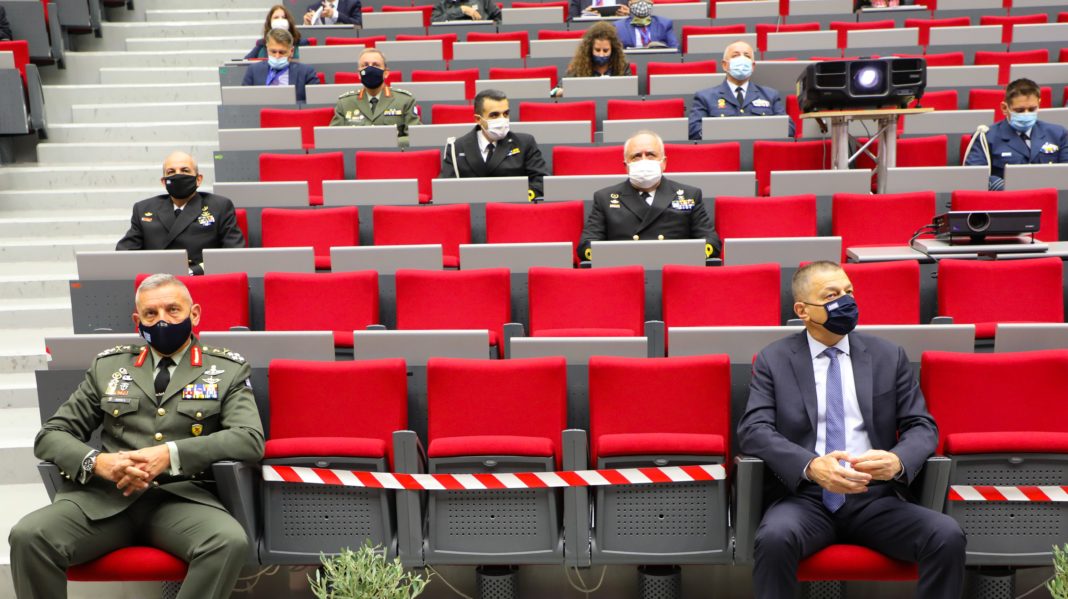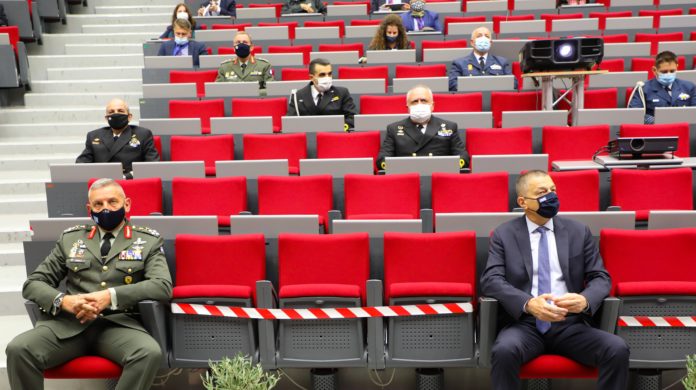Τη Δευτέρα 02 Νοεμβρίου 2020 ο Αρχηγός ΓΕΕΘΑ Στρατηγός Κωνσταντίνος Φλώρος συμμετείχε στην τελετή έναρξης του 15ου Σεμιναρίου Υψηλού Επιπέδου Κοινής Πολιτικής Ασφάλειας και Άμυνας [Common Security and Defence Policy High Level Course (CSDP)] «ALTINERO SPINELLI», στην οποία παραβρέθηκαν ο Υφυπουργός Εθνικής Άμυνας κ. Αλκιβιάδης Στεφανής, ο Αρχηγός ΓΕΑ Αντιπτέραρχος (Ι) Γεώργιος Μπλιούμης, ο Αρχηγός ΓΕΣ Αντιστράτηγος Χαράλαμπος Λαλούσης, ο Αρχηγός ΓΕΝ Αντιναύαρχος Στυλιανός Πετράκης ΠΝ και ο Γενικός Διευθυντής της Γενικής Διεύθυνσης Πολιτικής Εθνικής Άμυνας και Διεθνών Σχέσεων(ΓΔΠΕΑΔΣ) Δρ Κωνσταντίνος Π. Μπαλωμένος,
Το Σεμινάριο πραγματοποιήθηκε στη Σχολή Ικάρων στην Αεροπορική Βάση Δεκέλειας, υπό την αιγίδα της ΓΔΠΕΑΔΣ του Υπουργείου Εθνικής Άμυνας σε συνεργασία με το Ευρωπαϊκό Κολλέγιο Ασφάλειας και Άμυνας [European Security and Defense College (ESDC)] και σε υβριδική μορφή (συνδυασμός φυσικής παρουσίας και ταυτόχρονης παρακολούθησης από απόσταση με τηλεκπαίδευση).
Κατά την ομιλία του με θέμα «Ο Ρόλος των Ελληνικών Ενόπλων Δυνάμεων ως Παράγοντας Σταθερότητας και Ασφάλειας στα Βαλκάνια και την Ανατολική Μεσόγειο», ο Αρχηγός ΓΕΕΘΑ αναφέρθηκε στην κατάσταση που επικρατεί στα Βαλκάνια και στην Ανατολική Μεσόγειο με έμφαση στις τρέχουσες προκλήσεις ασφαλείας, όπως υβριδικές απειλές, τρομοκρατικές ενέργειες, βίαιος εξτρεμισμός, ενεργειακή ασφάλεια, κλιματική αλλαγή, οικονομική κρίση, διασυνοριακό οργανωμένο έγκλημα, με κορυφαία την παράνομη μετανάστευση σε συνδυασμό με την εξάπλωση της Πανδημίας COVID-19, η οποία έχει αναβαθμίσει σημαντικά το επίπεδο δυσκολίας αντιμετώπισης τους. Τόνισε δε ότι τώρα όσο ποτέ απαιτείται συντονισμένη συνεργασία μεταξύ όσων μοιράζονται τις ίδιες αξίες και σέβονται το Διεθνές Δίκαιο.
Στο πλαίσιο αυτό, επεσήμανε την σημασία του συνόλου των διεξαγόμενων επιχειρήσεων και πρωτοβουλιών που έχουν αναπτυχθεί στην ευρύτερη περιοχή ως προϊόν συμφωνιών και συνεργασιών μεταξύ κρατών, θεσμών και συμμαχιών με σκοπό να περιορίσουν την παραβατικότητα, να υλοποιήσουν τις αποφάσεις διεθνών οργανισμών και να προάγουν τη συνεργασία προς όφελος της σταθερότητας και της ειρήνης. Σε αυτές τις δράσεις η συμμετοχή της Ελλάδας είναι ιδιαιτέρως σημαντική είτε σε επίπεδο συνεργασίας, είτε συνδρομής με δυνάμεις, είτε παροχής διευκολύνσεων και υποστήριξης.
Στον αντίποδα αναφέρθηκε στον αποσταθεροποιητικό ρόλο που διαδραματίζει η Τουρκία με την προβολή παράλογων απαιτήσεων εις βάρος γειτόνων της, με τη σύναψη συμφωνιών που αντίκεινται στο Διεθνές Δίκαιο και στις αρχές καλής γειτονίας, πολύ δε περισσότερο με την ανάμιξη της σε ιδιαιτέρως ευαίσθητες περιοχές, υποδαυλίζοντας έτι περαιτέρω την αποσταθεροποίηση τους.
Ο Αρχηγός ΓΕΕΘΑ έδωσε επίσης έμφαση στο γεγονός ότι οι Ελληνικές Ένοπλες Δυνάμεις αποτελούν πυλώνα ασφάλειας και σταθερότητας στην περιοχή, προστατεύοντας τα σύνορα αλλά και τα συμφέροντα τόσο της χώρας μας όσο και της Ευρώπης. Η δε σχεδιασμένη αναδιοργάνωση τους θα συμβάλει στην αποτελεσματικότερη και αποδοτικότερη χρησιμοποίηση τους, στην αντιμετώπιση των σύγχρονων απειλών ασφαλείας στην ευρύτερη περιοχή αλλά και στην βελτίωση του επιπέδου συνεργασίας και διαλειτουργικότητας τους με Συμμάχους και Εταίρους.
Τέλος έκανε ιδιαίτερη μνεία αφενός στον ρόλο της Κρήτης και της μετατροπής της σε «φρούριο» για την προβολή ισχύος προς και από τη θάλασσα στην Κεντρική και Ανατολική Μεσόγειο, αφετέρου στην σημασία του «επανεξοπλισμού» των ΕΔ υποδηλώνοντας την ανάγκη άμεσης και επιτακτικής ενεργοποίησης εξοπλιστικών προγραμμάτων για την συντήρηση σύγχρονων και την αντικατάσταση παλαιών οπλικών συστημάτων με στοχευμένες ενέργειες, για την αναβάθμιση των δυνατοτήτων τους και τη διασφάλιση της αποτελεσματικότητας τους.
15 CSDP HIGH LEVEL COURSE 2019 “ALTINERO SPINELLI” MODULE 3
ATHENS 2 – 6 November 2020
The role of the Hellenic Armed Forces as a factor of Stability and
Security in the Balkans and the Eastern Mediterranean
Ladies and Gentlemen, distinguished guests and speakers, dear participants to the
15th Common Security and Defence Policy High Level Course “Altinero Spinelli”,
Good morning.
On behalf of the Hellenic Armed Forces, I would like to welcome you all to the Hellenic
Air Force Academy.
It is a real pleasure to have the opportunity to address you here today. I would like to thank Dr. Mpalomenos, the Director of the General Directorate of National Defence Policy and International Relations, along with the European Security and Defence College for inviting me to share my thoughts in the framework of this Flagship course.
Ladies and gentlemen, the Common Security and Defence Policy enables the Union to take a leading role in peace-keeping operations, conflict prevention and the strengthening of international security. The promotion of peace and security depends on the offer and added value of each member state to this important cause. So, in my remarks I will summarize the contribution of the Hellenic Armed Forces in our broad periphery.
The Balkans and the Eastern Mediterranean make up our own neighborhood, a highly volatile region of great strategic importance. Without a doubt, the European Union faces a wide range of security challenges emanating from this region. Just to name a few, we confront hybrid threats, acts of terrorism, violent extremism, energy security, smuggling, climate change, economic crises, and trans-border organized criminal activities which threaten to destabilize the region.
On top of these, we experience illegal migration and refugee flows in a density that poses a challenge for all of us. And since we have so little to worry about, the COVID-19 pandemic, as “strategic shock”, added another difficult factor to this equation.
The security environment in the wider region is overly complicated and volatile, mainly because it is shaped by ethnic animosities, revisionist policies, nationalism, conflict, weak democracies and feeble administrative institutions.
Failing to cope with these security challenges, will surely have a negative impact on the region’s stability, with repercussions in the wider neighborhood and beyond. Considering the diversity, scale and complexity of these challenges, we need now, more
than ever, a coordinated cooperation between allies and partners that share the same values and respect the international law.
It is now crystal clear that the Balkans and the Eastern Mediterranean hold an important geopolitical status in the global balance of power, despite the anticipations and predictions to the contrary that appeared in the dawn of the twenty – first century. The developments in the region draw the attention of key geopolitical players.
The war in Syria enters its tenth year, and we are far from achieving a political solution to the conflict. In addition, the ulterior motives of some actors involved jeopardize gains in the fight against the Islamic State. Libya faces a similar grave situation. The ongoing efforts of foreign actors to exploit the conflict, by establishing an enduring military presence or exerting control over resources that belong to the Libyan people, pose serious threats to regional stability. We should deal with the security situation in Syria and Libya at the earliest possible, as it fuels illegal migration, supports terrorist groups and threatens the cohesion between Allies and partners.
Only political solutions and the full respect of the UN arms embargo, by all actors involved, will bring a viable solution to the Libyan crisis. But diplomacy cannot succeed unless it is backed by credible action. Consequently, the decision of the European Council to launch the CSDP Operation EUNAVFOR MED IRINI, with the core task to implement the UN arms embargo, should be applauded.
Greece supported operation IRINI, with assets and personnel, from its outset. A Hellenic Navy officer, assumed the duty of the Force Commander on Oct 19th. I am confident that, under the guidance of Admiral Agostini, and supported by his multinational Staff onboard the Hellenic Frigate ADRIAS, the new Force Commander will work tirelessly to ensure the operations’ effectiveness in carrying out its important mission.
As I already mentioned, the lingering conflicts in the wider region are the root causes of many more challenges. Illegal migration and refugee flows from our sea and land borders with Turkey is a longstanding challenge for Greece and a potential asymmetric threat for our national security and for the security of Europe. Since 2015, Greece has been the entrance of well over one million illegal migrants, seeking admission into Europe.
As you are all aware, last February, Turkey opened its borders and forced thousands of migrants and refugees to move to Europe by crossing Evros river. Turkey’s attempt to weaponize human suffering failed completely, because we responded immediately and we protected our borders, which are also European borders.
The Hellenic Armed Forces have a decisive role in all efforts to address the refugee and migrant crisis. Specifically, they patrol the maritime and land borders on a 24/7 basis, while Hellenic Navy assets have a continuous and active participation in the NATO Aegean Activity, aiming to cut the lines of illegal trafficking and illegal migration. In addition, the Hellenic Armed Forces have assisted in the development and maintenance of reception and identification centers, to accommodate refugees and migrants on Greek territory.
Energy security is another issue of great concern, not only for the countries in the region but also for NATO, and especially the EU, which is seeking to improve its energy security by diversifying its sources. The Southeastern Mediterranean is an area where significant energy networks and international trade routes intersect. The recently found natural gas deposits have changed the geopolitical and geo-economic situation in the region, and increased tensions.
Ankara’s attempt to contest and seize Greek Exclusive Economic Zone (EEZ) and Continental Shelf (CS), by signing an illegal Agreement with the Government of National Accord of Libya for the delimitation of purported common boundaries, is an example of Turkey’s revisionist policy in the Eastern Mediterranean. This Agreement contravenes international law, violates our sovereign rights and seriously jeopardizes peace and stability in the region. By virtue of this agreement, she also unilaterally claimed that Greek islands, such as Crete, are deprived of their Exclusive Economic Zone and Continental Self.
It should be understood by all that sovereign rights over maritime zones can be legally exercised only through negotiated international agreements, between responsible governments, in full respect of the United Nations Law of the Sea. The recent agreements with Italy and Egypt, for the demarcation of our maritime zones, which are based on the International Law and good neighborly relations, serve as shining examples to solidify my point. Not to mention the latest example with the agreement between Greece and Albania to submit the issue of delimiting their maritime zones to the International Court in Hague. Anything else, like coercion, threats, intimidation, provocations, and military manipulation cannot be accepted by Europe.
Ankara’s latest provocative acts, with issuing consecutive illegal NAVTEXs announcing the conduct of illegal seismic surveys by the research vessel “ORUC REIS”, in areas which fall well within the Greek continental shelf, constitute a major escalation and a direct threat against peace and stability in the region. As you all know and as we talk, the research vessel is escorted by Turkish Navy war-ships, indicating Ankara’s will to militarize the issue against all efforts undertaken by NATO for military deconfliction and reduction of risk and accidents.
The Hellenic Armed Forces prove every day that they are a significant pillar of stability in the Eastern Medittearean by continuously safeguarding rightful national interests and sovereign rights along with the interests of the European Union.
This is a point to be made loud and clear. We are protecting, not only the Greek borders and interests, but also the European ones.
Furthermore, Greece, as a strong pillar of democracy and stability, plays a significant role in the region’s geopolitical configuration, especially by safeguarding European and Allied values, principles and interests. In this respect, the Hellenic Armed Forces, by tradition and tendency, consider engagement in both regional and global level security as one of their highest priorities, and thus take part in all relevant efforts and initiatives,
attaching particular importance to the role of international Organizations in protecting human rights. By maintaining a steady presence in ideals and posture we honor our commitments nationally and internationally, in the Framework of NATO, EU and the United Nations.
I would like to highlight our significant support to current NATO and EU missions and activities, through the contribution of national means and infrastructure of Souda Bay in Crete. Its variety of installations and facilities form a “One-Stop-Shop”, thus constituting a key enabler and force multiplier for Allies and partners. A forward located regroup, replenish, repair and training facility for naval and air assets moving towards or returning from operations, Crete has proved its paramount strategic importance in the Eastern Mediterranean.
As a significant actor in the wider region, The Hellenic Armed Forces establish new relations and further enhance long-standing ones, outside the Alliance and the EU. In this manner, we have established productive relations and cooperation with our regional partners on a multinational and on a bilateral level. In a nutshell, Greece and the Hellenic Armed Forces maintain excellent relations with almost all countries in the region, which are widely accepted and appreciated.
The Hellenic Armed Forces play a key role in promoting synergies, cooperation and good neighborly relations, acting as a catalyst of stability among countries in the Eastern Mediterranean and the Gulf. Especially with Israel, Egypt, and Cyprus, we work closely and continuously, at trilateral and bilateral level, to promote stability and security. We enjoy also the same level of cooperation with all countries in the Balkans, Jordan, United Arab Emirates, Saudi Arabia and Morocco, as well as with many other countries in our periphery.
We exploit our traditional relations with countries in the Eastern Mediterranean and the Gulf, promoting Defence Diplomacy. We host multilateral military exercises, where NATO allies and partners train side-by-side. In this context, I would like to emphasize on the conduct of our Air Force exercise HNIOCHOS with participants from USA, UK, UAE, Israel, Italy, Egypt, Cyprus, and Joint exercise MEDUSA – participants from Egypt, Jordan, Bahrain, S. Arabia, France USA, UAE.
We have been taking part in the UN peace-keeping Operation UNIFIL, with no interruption, since 2007. Hellenic Naval units, serving under the “blue-flag”, patrol off the coast of Lebanon, for the noble cause of the UN to promote peace and stability in the region, and assist the capacity building efforts of the Lebanese authorities.
I need also to mention the quadripartite initiative between Italy-Greece-France and Cyprus, materialized with Exercise EUNOMIA. This initiative demonstrates the commitment of the four European Mediterranean countries to the rule of law as part of the policy of de-escalating tensions.
In the Balkans, we work closely along with all countries in the region, and maintain bilateral and multilateral military cooperation initiatives with Albania, Bulgaria, North
Macedonia, Romania and Serbia. In the Adriatic and Ionian Seas, the Hellenic Navy has been one of the leading parties of the Adriatic-Ionian initiative (ADRION), an expression of regional cooperation with the Navies of Greece, Italy, Albania, Montenegro, Croatia and Slovenia, promoting maritime security in the Ionian-Adriatic Region.
I would also like to emphasize our strategic defense cooperation with the United States, with one of its main objectives being the promotion of peace and stability in the MENA region. I am also very pleased to stress, that the military-to-military cooperation between Greece and United States is stronger than ever before. It covers a wide range of activities, from training and exercises, to infrastructure projects, and US forces deployments in Greece or through Greece. The latest important development in our cooperation, with the switch of USS Hershel “Woody” Williams home port from Norfolk to Souda, Crete, earmarks our strategic cooperation.
To meet our demanding tasks and achieve our mission, our Force Structure, being tailored to the particularities of the operational environment in the Aegean and the Eastern Mediterranean, is providing our forces with the means to project power within the area of strategic interest, to conduct all kinds of operations, support state diplomacy, and to operate jointly in concert with our Allies and Partners.
Against this background, very important decisions have been made recently, in regard to efforts that the Hellenic National Defense General Staff and I personally have worked very systematically and really hard to succeed.
And I am talking first about the project “FORTRESS CRETE”, which is under scrutiny in terms of defining all necessary means and capabilities to project power at sea and from the sea in the Central and East Mediterranean. Crete was, is and will always be the right place for such purposes and it is now the right time to take the initiative and proceed to the upgrade of its naval and airborne capabilities in complementarity with its current significant military footprint. We owe to our friends, partner and allies, but most of all we owe it to ourselves and to our commitment for projecting peace and stability in our area of interest.
Second and as our Prime Minister has stated and stressed very recently, procurements are resuming after a 10-year stall. The project of “REARMAMANT” is comprehensive and the approach holistic. In this respect, we will upgrade our Force Structure in a “fast and furious” manner, with a combination of means and capabilities that nobody will be able to ignore. In this way, Greece and the Hellenic Armed Forces will honor their security provider role vis-à-vis the security consumer preference other actors in our region seem to fancy and exercise in a quite provocative and counter-productive manner.
In this time of rapid changes, turbulence, and unpredictable challenges, which underline the requirement for adaptation, flexibility, agility and modularity, the Hellenic Armed Forces are determined to remain on the “frontline”, by continuously presenting their decisiveness to being relevant, capable, credible, proactive and qualified.
Ladies and Gentlemen,
I outlined all the good reasons why the Hellenic Armed Forces are internationally considered – and indeed they are – a significant peace and stability provider in the East Med and the Balkans.
The Hellenic Armed Forces maintain a “steady course” towards the future, with their military tradition as the “compass”; and the preservation of defence and security as their destination. In this journey, the hearts, souls and impeccable performance of our people and the multi-millennia history of our nation make me as proud a leader as one could be.
Thank you very much for your attention.




